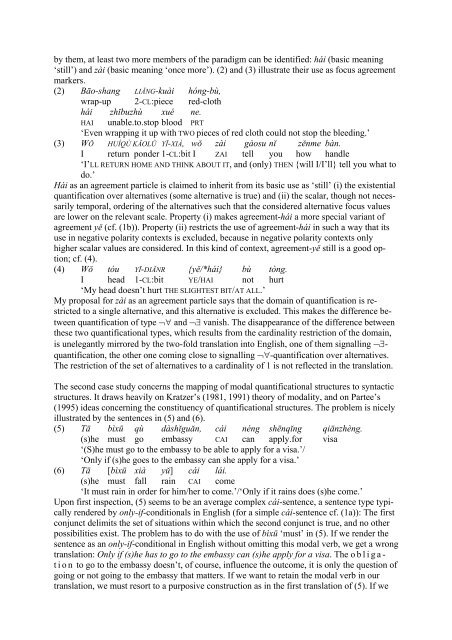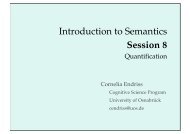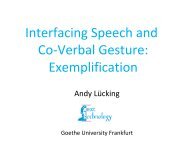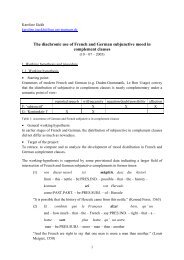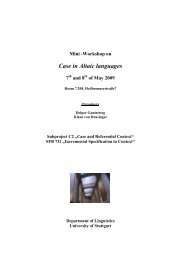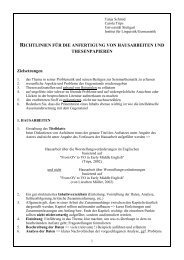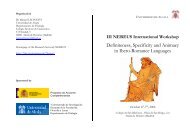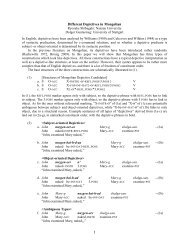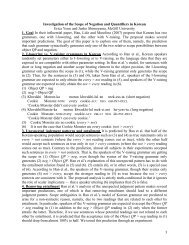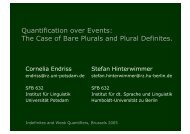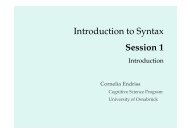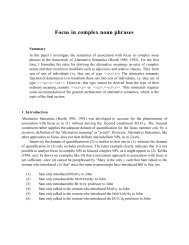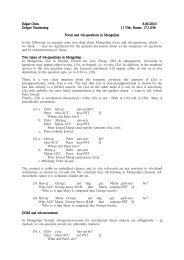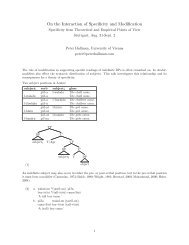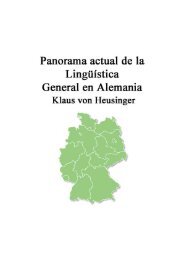SemPrag03.Progr.pdf - Institut für Linguistik/Germanistik - Universität ...
SemPrag03.Progr.pdf - Institut für Linguistik/Germanistik - Universität ...
SemPrag03.Progr.pdf - Institut für Linguistik/Germanistik - Universität ...
Create successful ePaper yourself
Turn your PDF publications into a flip-book with our unique Google optimized e-Paper software.
y them, at least two more members of the paradigm can be identified: hái (basic meaning<br />
‘still’) and zài (basic meaning ‘once more’). (2) and (3) illustrate their use as focus agreement<br />
markers.<br />
(2) Bāo-shang LIĂNG-kuài hóng-bù,<br />
wrap-up 2-CL:piece red-cloth<br />
hái zhĭbuzhù xué ne.<br />
HAI unable.to.stop blood PRT<br />
‘Even wrapping it up with TWO pieces of red cloth could not stop the bleeding.’<br />
(3) W Ŏ HUÍQÙ KĂOLǛ YĪ-XIÀ, wŏ zài gàosu nĭ zĕnme bàn.<br />
I return ponder 1-CL:bit I ZAI tell you how handle<br />
‘I’LL RETURN HOME AND THINK ABOUT IT, and (only) THEN {will I/I’ll} tell you what to<br />
do.’<br />
Hái as an agreement particle is claimed to inherit from its basic use as ‘still’ (i) the existential<br />
quantification over alternatives (some alternative is true) and (ii) the scalar, though not necessarily<br />
temporal, ordering of the alternatives such that the considered alternative focus values<br />
are lower on the relevant scale. Property (i) makes agreement-hái a more special variant of<br />
agreement yĕ (cf. (1b)). Property (ii) restricts the use of agreement-hái in such a way that its<br />
use in negative polarity contexts is excluded, because in negative polarity contexts only<br />
higher scalar values are considered. In this kind of context, agreement-yĕ still is a good option;<br />
cf. (4).<br />
(4) Wŏ tóu YĪ-DIĂNR {yĕ/*hái} bù tòng.<br />
I head 1-CL:bit YE/HAI not hurt<br />
‘My head doesn’t hurt THE SLIGHTEST BIT/AT ALL.’<br />
My proposal for zài as an agreement particle says that the domain of quantification is restricted<br />
to a single alternative, and this alternative is excluded. This makes the difference between<br />
quantification of type ¬∀ and ¬∃ vanish. The disappearance of the difference between<br />
these two quantificational types, which results from the cardinality restriction of the domain,<br />
is unelegantly mirrored by the two-fold translation into English, one of them signalling ¬∃quantification,<br />
the other one coming close to signalling ¬∀-quantification over alternatives.<br />
The restriction of the set of alternatives to a cardinality of 1 is not reflected in the translation.<br />
The second case study concerns the mapping of modal quantificational structures to syntactic<br />
structures. It draws heavily on Kratzer’s (1981, 1991) theory of modality, and on Partee’s<br />
(1995) ideas concerning the constituency of quantificational structures. The problem is nicely<br />
illustrated by the sentences in (5) and (6).<br />
(5) Tā bìxū qù dàshĭguăn, cái néng shēnqĭng qiānzhèng.<br />
(s)he must go embassy CAI can apply.for visa<br />
‘(S)he must go to the embassy to be able to apply for a visa.’/<br />
‘Only if (s)he goes to the embassy can she apply for a visa.’<br />
(6) Tā [bìxū xià yŭ] cái lái.<br />
(s)he must fall rain CAI come<br />
‘It must rain in order for him/her to come.’/‘Only if it rains does (s)he come.’<br />
Upon first inspection, (5) seems to be an average complex cái-sentence, a sentence type typically<br />
rendered by only-if-conditionals in English (for a simple cái-sentence cf. (1a)): The first<br />
conjunct delimits the set of situations within which the second conjunct is true, and no other<br />
possibilities exist. The problem has to do with the use of bìxū ‘must’ in (5). If we render the<br />
sentence as an only-if-conditional in English without omitting this modal verb, we get a wrong<br />
translation: Only if (s)he has to go to the embassy can (s)he apply for a visa. The obligat<br />
i o n to go to the embassy doesn’t, of course, influence the outcome, it is only the question of<br />
going or not going to the embassy that matters. If we want to retain the modal verb in our<br />
translation, we must resort to a purposive construction as in the first translation of (5). If we


